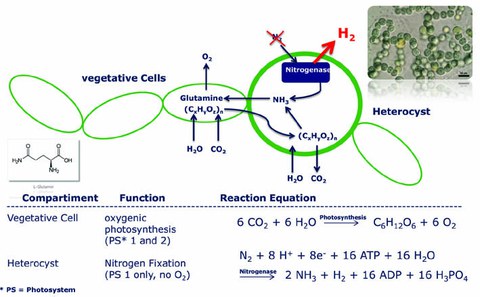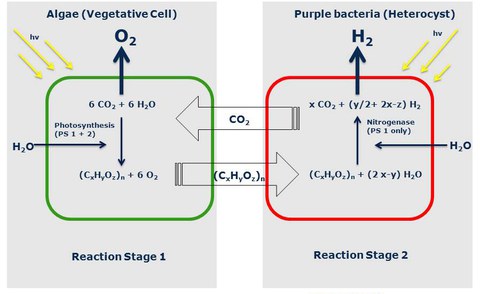White Biotechnology for hydrogen synthesis: Development of the procedural foundations to produce biogenic hydrogen in novel photobioreactors by an interdisciplinary research group
| Project leader: Group leader: |
Prof. Dr. rer. nat. habil. Thomas Bley Dr.-Ing. Jost Weber |
Agenda:
The turnaround to sustainable energy supply originating from renewable resources represents the biggest challenge the industrialized societies ever faced. Besides the finite nature of the fossil fuel supply and the increasing energy demand of the emerging markets and the impact of the generation and consumption of fossil fuels on climate and environment directs the economies to the exploration of renewable energy sources. Hydrogen is characterized by its high gravimetric fuel value. Further this fuel is free of carbon yielding in water as a combustion product. This means no climate damaging carbon dioxide is formed. Consequently the German National Academy of Sciences ‘Leopoldina’ recommended in its study ‘Bioenergy – Chances and Limits’ in 2012: “Considering the almost unlimited availability of water and sunlight, the production of hydrogen via photolytic cleavage of water could be an ideal energy source – renewable, environmentally friendly, and sustainable.”
The goal of this project is the development of novel bioreactor technology for the cultivation of bacteria as hydrogen producers. The efforts in this project should result in the implementation of a process where both green algae and purple non-sulfur bacteria are cultivated in one bioreactor system. The carbon hydrate equivalents formed by the green algae serve as electron donors for the photo-heterotrophic purple non-sulfur bacteria. The cultivation of the latter under illumination and in the absence of nitrogen leads to the production of hydrogen in combination with carbon dioxide. The carbon dioxide again will be bound by the Calvin cycle of the green algae.
Consequently an extensive concept for the conversion of solar power into sustainable fuel is going to be developed. To achieve this new concepts of photobioreactors will be designed and evaluated. Here the supply of the microorganisms with light is of pivotal importance. This becomes challenging, if the production is scaled to pilot- or production-scale. To cope with this innovative fiber-optics will conduct the collected sunlight into the working volume of the reactor. High precision and tailor made sensors for the specific demands of these reactions allow deeper insights in the conversions taking place in the reactor. This allows the identification of production related process parameters that are critical for yields and productivities. By application of this knowledge a purposeful optimization of the processes can be performed. While still under development both, the processes and the equipment, the environmental friendliness, economic viability, and feasibility are analyzed.
Due to the high penetration depth of the topic, based on the fundamental approach by an interdisciplinary research group, significant synergies are created which drive to innovations.
Collaborators:
(sorted by participating chairs)
Chair of Bioprocess Engineering, Institute of Food Technology and Bioprocess Engineering, Faculty of Mechanical Science and Engineering
Prof. Dr. rer. nat. habil. Thomas Bley
Tel.: +49-(0)351-463 32420
bioverfahrenstechnik(at)tu-dresden.de
Researcher/
project staff
Research focus
Contact data
Dr.-Ing.
Jost Weber
- group head Bioprocess Engineering
- analytics
Tel.: +49-(0)351-463 32727
jost.weber(at)tu-dresden.de
Dipl.-Ing.
Karsten Helbig
- optimization of operational conditions
- reactor design
Tel.: +49-(0)351-463 32727
karsten.helbig(at)tu-dresden.de
Dr. rer. nat.
Simone Thierfelder
- genetic engineering of microorganisms
Tel.: +49-(0)351-463 36943
simone.thierfelder(at)tu-dresden.de
CTA
Marina Scholz
- screening and cultivation of microorganisms, analytics
Tel.: +49-(0)351-463 35666
marina.scholz(at)tu-dresden.de
Chair of Hydrogen and Nuclear Energy, Institute of Power Engineering, Faculty of Mechanical Science and Engineering
Prof. Dr.-Ing. habil. Antonio Hurtado
Tel.: +49-(0)351-463 34472
antonio.hurtado(at)tu-dresden.de
Researcher
Reseach focus
Contact data
Dipl.-Ing.
Sara Grützner
- concepts for purification, storage and usage of hydrogen
Tel.: +49-(0)351-463 39846
sara.gruetzner(at)tu-dresden.de
Chair of Business Administration, especially Environmental Management and Accounting, Faculty of Business and Economics
Prof. Dr. Edeltraud Günther
Tel.: +49-(0)351-463 34313
bu(at)mailbox.tu-dresden.de
Researcher
Research focus
Contact data
Dipl.-Kffr.
Jana Herrmann
- hurdle analysis
Tel.: +49-(0)351-463 37764
jana.herrmann(at)tu-dresden.de
Dipl.-Wirt.-Ing.
Georg Bienert
- environmental performance evaluations
Tel.: +49-(0)351-463 35494
georg.bienert(at)tu-dresden.de
Chair of Physical Chemistry / Measurement and Sensor Technology, Department of Chemistry and Food Chemistry Faculty of Sciences
Prof. Dr. rer. nat. et Ing. habil. Michael Mertig
Tel.: +49-(0)351-479 40290
michael.mertig(at)tu-dresden.de
Researcher
Research focus
Contact data
Dr. rer. nat.
Nora Haufe
- development of sensor systems for online measurement of disscolved hydrogen
Tel.: +49-(0)351-479 40292
nora.haufe(at)tu-dresden.de
Chair of Material Science and Nanotechnology, Institute for Materials Science, Faculty of Mechanical Science and Engineering
Prof. Dr. Gianaurelio Cuniberti
Tel.: +49-(0)351-463 31420
office(at)nano.tu-dresden.de
Researcher
Research focus
Contact data
M.Eng.
Rico Illing
- design of fiber optics for the illumination of bioreactors
Tel.: +49-(0)351-463 39406
rico.illing(at)nano.tu-dresden.de
Chair of Chemical Engineering and Plant Design, Institute for Process and Environmental Engineering, Faculty of Mechanical Science and Engineering
Prof. Dr.-Ing. habil. Rüdiger Lange
Tel.: +49-(0)351-463 35181
ruediger.lange(at)tu-dresden.de
Researcher
Research focus
Contact data
Dipl.-Ing.
Gerd Hilpmann
- reactor design
- application of monoliths to increase hydrogen yields
Tel.: +49-(0)351-463 39123
gerd.hilpmann(at)tu-dresden.de
Press coverage (in German language only):
- 01.08.2012:press release of the TU Dresden - Zukunftstechnologie für die Sächsische Energiewirtschaft: TU Dresden richtet Nachwuchsforschergruppe zur biotechnologischen Gewinnung von Wasserstoff ein
- 01.08.2012: MW-Blick (Newsletter of the Faculty of Mechanical Science and Engineering) - Nachwuchsforschergruppe zur Bioenergie eingerichtet: MW-Blick 16/2012
- 02.08.2012: ATZ online - Nachwuchsforscher entwickeln Prozess zur biotechnologischen Wasserstoffgewinnung
- 19.09.2012: Biotechnologie.de - Information platform of the Federal Ministry of Research and Education - Wasserstoff aus dem Bio-Tank
Project funding:
- European Social Funds (ESF)
- The Free State of Saxony
Project number: 100098189
Project term:
01.08.2012 - 31.12.2014
Contact:
Weber, Bley


